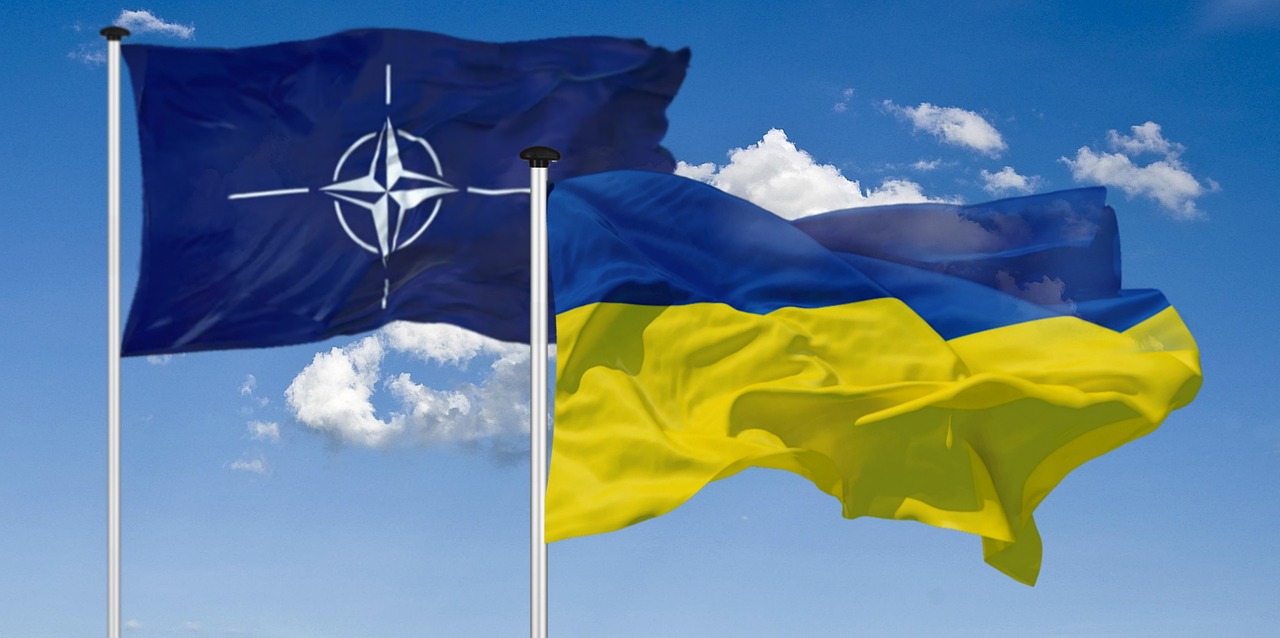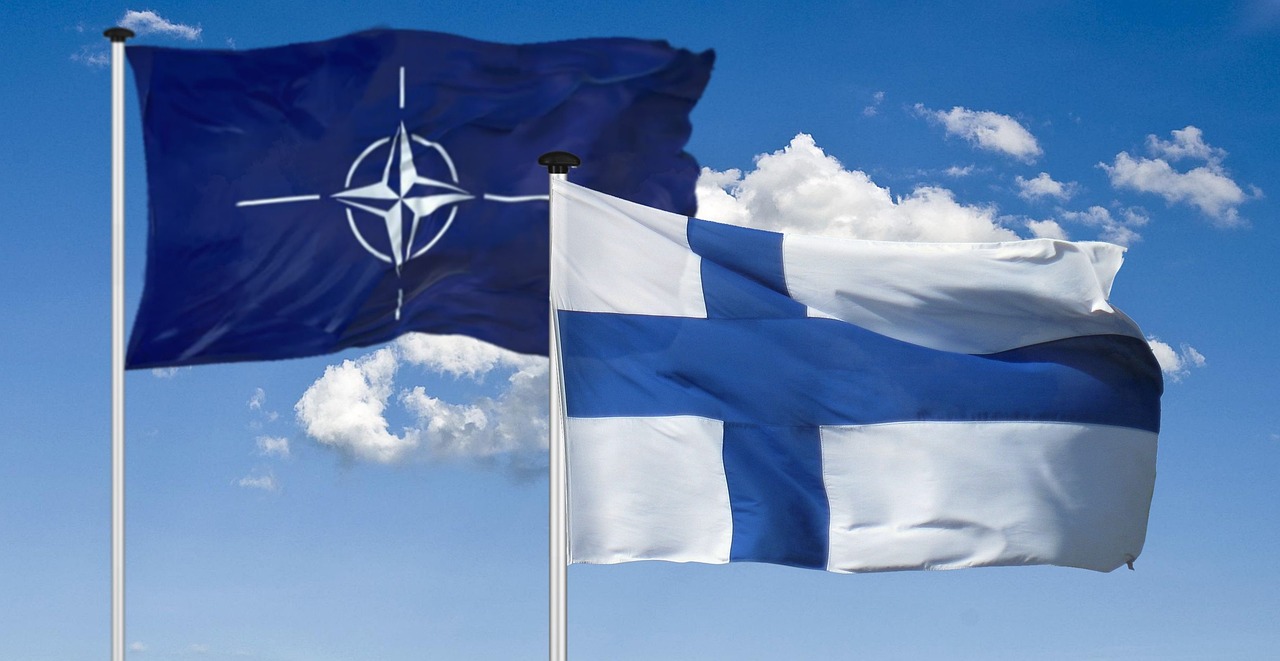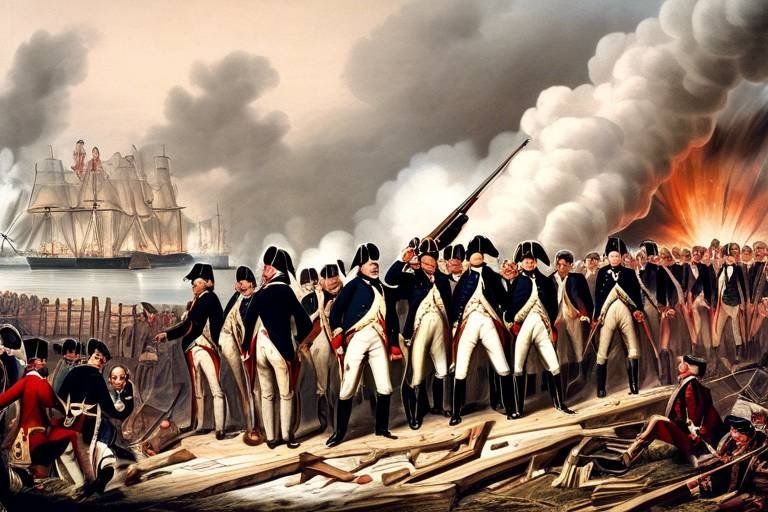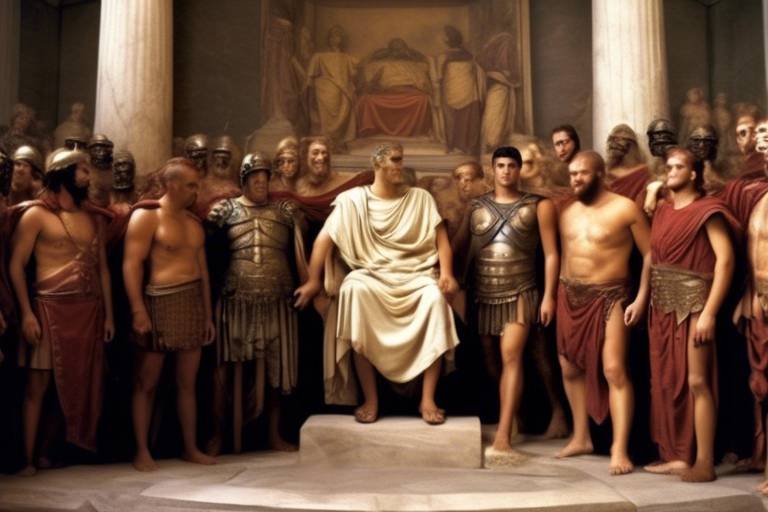The Role of Diplomacy in World History
Diplomacy, the art of negotiation and communication between nations, has played a pivotal role in shaping the course of world history. From ancient civilizations to the modern era, diplomatic relations have influenced alliances, conflicts, and the direction of global events. By examining the impact and significance of diplomacy throughout history, we can gain a deeper understanding of how nations have interacted and cooperated in the pursuit of common goals.
In ancient times, diplomatic practices such as treaties, embassies, and negotiations laid the foundation for the sophisticated diplomatic systems we see today. Civilizations like the Greeks, Romans, and Chinese engaged in diplomatic exchanges to maintain peace, establish trade relationships, and resolve disputes without resorting to violence. These early diplomatic efforts set the stage for the development of formal diplomatic protocols that continue to guide international relations.
During the medieval period, diplomacy played a crucial role in the interactions between empires, kingdoms, and feudal states. From the Byzantine Empire to the European feudal system, diplomatic envoys were sent to negotiate treaties, secure alliances, and navigate the complex web of power dynamics in the region. The diplomatic practices of the Middle Ages laid the groundwork for the modern concept of statecraft and diplomacy.
The Age of Exploration witnessed a surge in diplomatic efforts as European powers ventured into new territories and encountered indigenous peoples. Treaties, trade agreements, and conflicts between nations shaped the course of exploration and colonization. Diplomatic negotiations determined the boundaries of empires, the distribution of resources, and the establishment of new trade routes, highlighting the role of diplomacy in shaping global expansion.
As the world entered the modern era, diplomacy evolved to address the complexities of international relations on a global scale. The Congress of Vienna, the League of Nations, and the United Nations emerged as key institutions for diplomatic cooperation, conflict resolution, and the promotion of peace and security. Diplomatic efforts in the modern era have been instrumental in shaping the framework of global governance and addressing pressing global challenges.
Throughout the World Wars, diplomacy played a critical role in shaping the outcomes of conflicts and forging alliances between nations. From the intricate network of alliances that led to World War I to the peace negotiations and post-war reconstruction efforts following World War II, diplomacy has been central to the resolution of global conflicts. The impact of failed diplomatic efforts during these tumultuous periods underscored the importance of effective communication and negotiation in preventing future conflicts.
In contemporary times, cultural diplomacy and soft power have emerged as essential tools in fostering understanding and cooperation between nations. The exchange of arts, ideas, and values has become a key aspect of diplomatic relations, promoting mutual respect and dialogue across diverse cultures. By leveraging cultural diplomacy, nations can bridge differences, build trust, and promote peaceful coexistence in an increasingly interconnected world.
The rise of digital diplomacy in the information age has revolutionized the practice of international relations, enabling diplomats to engage with global audiences through social media, online platforms, and digital technologies. Digital diplomacy has expanded the reach of diplomatic efforts, allowing for real-time communication, public engagement, and the dissemination of information on a global scale. In an era defined by rapid technological advancements, digital diplomacy has become a powerful tool for shaping public opinion and influencing diplomatic strategies.
As we look towards the future, diplomacy faces a new set of challenges and opportunities in addressing pressing global issues. From cybersecurity threats to climate change and the rise of populism, diplomats must navigate complex geopolitical landscapes and emerging threats to international peace and security. By exploring innovative diplomatic practices, fostering multilateral cooperation, and adapting to the changing dynamics of international relations, nations can effectively address the challenges of the 21st century and shape a more peaceful and prosperous world.

Early Diplomatic Practices
Exploring the impact and significance of diplomatic relations between nations throughout history, shaping alliances, conflicts, and the course of global events.
During ancient times, diplomatic practices were crucial in establishing peaceful relations and resolving conflicts between civilizations. Treaties, considered as formal agreements, played a pivotal role in setting boundaries and outlining terms of engagement. Embassies served as diplomatic missions, facilitating communication and negotiation between different rulers and states. These early practices laid the foundation for the structured and protocol-driven diplomacy that we see today.

Diplomacy in Medieval Times
During the Medieval Times, diplomacy played a crucial role in shaping the political landscape of Europe. The feudal system prevalent in this era necessitated constant negotiations and agreements between lords, kings, and emperors to maintain stability and resolve disputes. Diplomatic missions were often carried out through emissaries who traveled long distances to deliver messages and negotiate treaties. These envoys acted as intermediaries, facilitating communication between rulers and fostering alliances.
One significant aspect of medieval diplomacy was the concept of diplomatic immunity, which granted protection to envoys from foreign powers, ensuring their safety and freedom to conduct negotiations without fear of reprisal. This practice laid the foundation for the modern diplomatic protocols that govern international relations today. Treaties and agreements were meticulously crafted to outline terms of engagement, borders, and trade agreements, setting the stage for diplomatic relations between kingdoms and empires.
The Byzantine Empire, known for its intricate diplomatic network, established embassies in various regions to maintain political influence and secure alliances. These diplomatic missions were instrumental in fostering cultural exchanges, sharing knowledge, and promoting trade relations between the Byzantines and other civilizations. In addition, the practice of sending gifts and tributes as gestures of goodwill was common in medieval diplomacy, symbolizing respect and friendship between nations.
As Europe emerged from the Dark Ages and entered the High Middle Ages, the role of diplomacy expanded to include complex peace negotiations, marriage alliances, and the resolution of religious conflicts. The Church also played a significant role in diplomatic affairs, mediating disputes and promoting unity among Christian kingdoms. The Council of Constance in 1414-1418, for example, aimed to end the Papal Schism and restore unity within the Catholic Church through diplomatic negotiations and consensus-building.
Overall, diplomacy in Medieval Times was characterized by intricate rituals, protocols, and codes of conduct that governed interactions between rulers and states. The art of diplomacy was essential in maintaining order, resolving conflicts, and establishing long-lasting alliances that shaped the course of European history during this tumultuous period.

The Age of Exploration and Diplomacy
Exploring the impact and significance of diplomatic relations between nations throughout history, shaping alliances, conflicts, and the course of global events.
Examining the origins of diplomatic practices in ancient civilizations, including treaties, embassies, and negotiations that laid the foundation for modern diplomacy.
Analyzing the role of diplomacy in the Middle Ages, from the Byzantine Empire to the European feudal system, and the development of diplomatic protocols.
The Age of Exploration marked a pivotal period in history where diplomatic efforts played a crucial role in shaping global interactions. European powers embarked on voyages to discover new lands, resources, and trade routes, leading to encounters with indigenous peoples. Diplomatic relations during this era were characterized by a complex interplay of treaties, alliances, and conflicts as nations vied for power and influence.
Discussing the evolution of diplomacy in the modern era, from the Congress of Vienna to the League of Nations and the United Nations, shaping global governance.
Exploring how diplomacy played a crucial role in World War I and II, including alliances, peace negotiations, and the impact of failed diplomatic efforts on global conflicts.
Examining the use of cultural diplomacy and soft power in international relations, including the exchange of arts, ideas, and values to promote understanding and cooperation.
Analyzing the influence of digital diplomacy in the information age, utilizing social media, online platforms, and technology to shape public opinion and diplomatic strategies.
Discussing the current challenges facing diplomacy, such as cybersecurity threats, climate change, and the rise of populism, and exploring future trends in diplomatic practices.

Diplomacy in the Modern Era
In the modern era, diplomacy has evolved significantly, playing a crucial role in shaping global governance and international relations. One of the key milestones in modern diplomacy was the Congress of Vienna in 1814, where European powers came together to redraw the map of Europe after the Napoleonic Wars. This diplomatic conference not only established a new balance of power but also set the stage for future multilateral negotiations and alliances.
Following the devastating impact of World War I, the League of Nations was established in 1920 with the aim of preventing future conflicts through diplomatic means. While the League ultimately failed to prevent World War II, it laid the groundwork for the establishment of the United Nations in 1945. The United Nations, with its Security Council and General Assembly, has become a vital forum for diplomatic negotiations, peacekeeping efforts, and international cooperation.
Moreover, the modern era has seen the rise of economic diplomacy, where nations use trade agreements, economic sanctions, and international organizations like the World Trade Organization to advance their interests and resolve disputes. Economic diplomacy has become a key tool in promoting global prosperity and stability, as seen in the negotiation of free trade agreements and investment treaties.
Furthermore, the advent of digital diplomacy in the information age has revolutionized how nations communicate and engage with each other and the public. Social media platforms, online forums, and digital technologies have enabled diplomats to reach a wider audience, shape public opinion, and conduct virtual negotiations in real-time. Digital diplomacy has blurred the lines between traditional diplomacy and public diplomacy, creating new opportunities and challenges in the diplomatic landscape.

Role of Diplomacy in World Wars
The role of diplomacy in World Wars was pivotal in shaping the course of these global conflicts. World War I, also known as the Great War, erupted due to a complex web of diplomatic alliances and rivalries among European powers. The intricate system of alliances, particularly the entente between France, Russia, and the United Kingdom, and the Central Powers led by Germany and Austria-Hungary, played a significant role in escalating the conflict.
Diplomatic efforts to maintain peace and prevent the outbreak of war ultimately failed, as the assassination of Archduke Franz Ferdinand of Austria in 1914 triggered a chain reaction of events that culminated in a full-scale war. Despite diplomatic negotiations and peace initiatives, the war continued to escalate, resulting in massive casualties and the redrawing of national borders.
During World War II, diplomacy once again played a crucial role in shaping the alliances and strategies of the warring parties. The policy of appeasement pursued by Western powers towards Nazi Germany in the 1930s, aimed at avoiding conflict through concessions, ultimately failed to prevent the outbreak of war. Diplomatic efforts to negotiate peace and resolve conflicts proved challenging amid the aggressive expansionist policies of totalitarian regimes.
The role of diplomacy in World Wars extended beyond the battlefield, encompassing peace negotiations, armistice agreements, and post-war reconstruction efforts. The Treaty of Versailles, which ended World War I, imposed harsh penalties on Germany and set the stage for future conflicts. Similarly, the diplomatic negotiations at the end of World War II led to the division of Europe and the onset of the Cold War between the Soviet Union and Western powers.

Cultural Diplomacy and Soft Power
Cultural diplomacy and soft power play a significant role in shaping international relations by fostering mutual understanding and cooperation through the exchange of arts, ideas, and values. This form of diplomacy goes beyond traditional political alliances and economic agreements, focusing on building relationships at the cultural level.
Through cultural exchanges, nations can showcase their unique heritage, traditions, and creativity, creating a platform for dialogue and collaboration. Cultural diplomacy promotes cross-cultural dialogue and appreciation, breaking down stereotypes and fostering empathy among nations.
One example of cultural diplomacy is the use of art exhibitions, music performances, and film festivals to promote a country's cultural identity on the global stage. These cultural events serve as a bridge between nations, facilitating people-to-people connections and promoting cultural diversity.
Furthermore, soft power, a concept coined by political scientist Joseph Nye, refers to the ability of a country to influence others through non-coercive means such as culture, values, and policies. Soft power enhances a nation's reputation and attractiveness, shaping perceptions and building goodwill among other countries.
By leveraging cultural diplomacy and soft power, countries can enhance their international standing, build trust with other nations, and promote peaceful cooperation. In an increasingly interconnected world, cultural exchanges and shared values are essential tools for fostering global harmony and understanding.

Digital Diplomacy in the Information Age
Exploring the impact and significance of diplomatic relations between nations throughout history, shaping alliances, conflicts, and the course of global events.
Examining the origins of diplomatic practices in ancient civilizations, including treaties, embassies, and negotiations that laid the foundation for modern diplomacy.
Analyzing the role of diplomacy in the Middle Ages, from the Byzantine Empire to the European feudal system, and the development of diplomatic protocols.
Investigating how diplomatic efforts influenced the Age of Exploration, including treaties, trade agreements, and conflicts between European powers and indigenous peoples.
Discussing the evolution of diplomacy in the modern era, from the Congress of Vienna to the League of Nations and the United Nations, shaping global governance.
Exploring how diplomacy played a crucial role in World War I and II, including alliances, peace negotiations, and the impact of failed diplomatic efforts on global conflicts.
Examining the use of cultural diplomacy and soft power in international relations, including the exchange of arts, ideas, and values to promote understanding and cooperation.
As we navigate the complexities of the Information Age, digital diplomacy has emerged as a powerful tool in shaping international relations. With the rapid advancement of technology, diplomats now utilize social media platforms, online communication channels, and digital tools to engage with global audiences and influence public opinion.

Challenges and Future Trends in Diplomacy
Exploring the impact and significance of diplomatic relations between nations throughout history, shaping alliances, conflicts, and the course of global events.
In the ever-evolving landscape of international relations, diplomacy faces a myriad of challenges that require innovative solutions. One of the pressing issues is cybersecurity threats, where digital espionage and cyber attacks pose a significant risk to diplomatic communications and sensitive information. Governments must adapt to these new forms of warfare to safeguard their diplomatic efforts.
Furthermore, the looming threat of climate change has become a central concern in diplomatic circles. As environmental issues increasingly transcend national borders, diplomats are tasked with negotiating global agreements to address climate change, sustainable development, and resource management. The ability to navigate these complex environmental challenges will be crucial for the future of diplomacy.
Another challenge on the horizon is the rise of populism and nationalist movements, which can undermine diplomatic efforts towards international cooperation and peace. Diplomats must navigate the shifting political landscapes of various countries to foster dialogue and collaboration, even in the face of growing isolationism.
Looking ahead, future trends in diplomacy point towards greater reliance on technology and digital platforms. The use of artificial intelligence, big data analytics, and virtual diplomacy tools are expected to revolutionize diplomatic practices, streamlining communication and decision-making processes on a global scale.
Moreover, the increasing interconnectedness of the world demands a more inclusive and diverse approach to diplomacy. Embracing cultural diplomacy and soft power strategies will be essential in building bridges between nations, fostering mutual understanding, and promoting peaceful coexistence in an increasingly complex geopolitical environment.
As diplomats continue to navigate these challenges and embrace future trends, the role of diplomacy in shaping the course of global events remains paramount, highlighting the enduring significance of diplomatic relations in world history.
Frequently Asked Questions
- What is the role of diplomacy in world history?
The role of diplomacy in world history is crucial, as it involves the management of international relations between nations through peaceful negotiations, treaties, and agreements. Diplomacy has shaped alliances, resolved conflicts, and influenced the course of global events throughout history.
- What are some examples of early diplomatic practices?
Early diplomatic practices include the use of treaties, establishment of embassies, and conducting negotiations between ancient civilizations. These practices laid the foundation for modern diplomatic protocols and set the stage for future diplomatic relations.
- How has diplomacy evolved in the modern era?
In the modern era, diplomacy has evolved from traditional state-to-state interactions to include multilateral organizations like the United Nations and regional alliances. The focus has shifted towards addressing global challenges such as climate change, cybersecurity, and promoting peace and cooperation among nations.



















